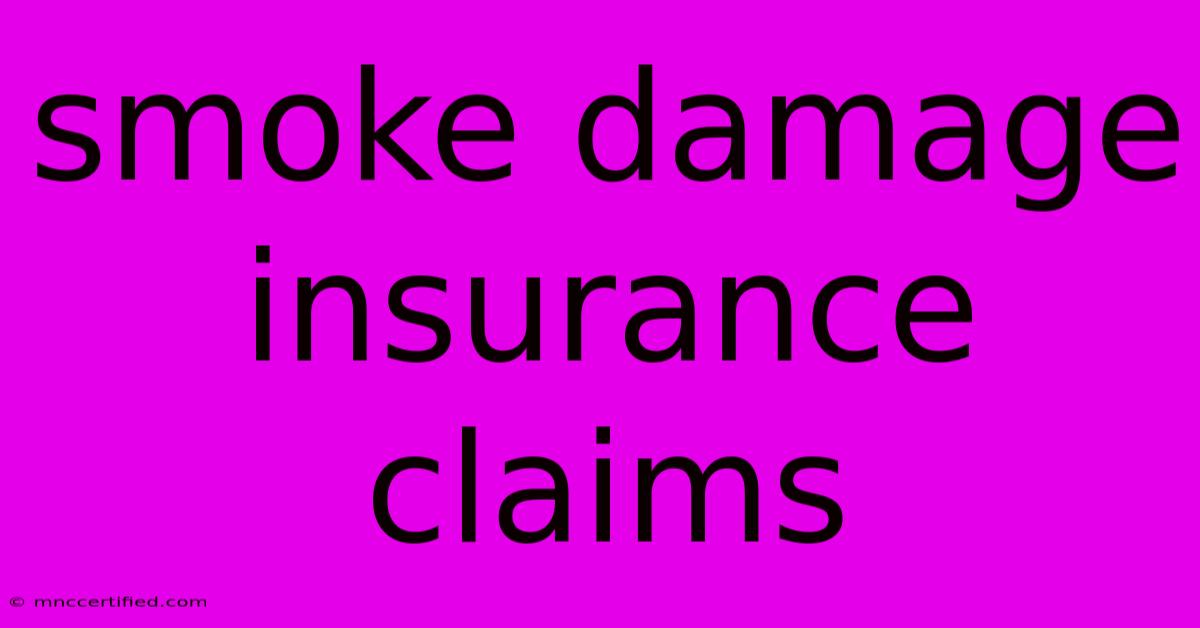Smoke Damage Insurance Claims

Table of Contents
Navigating Smoke Damage Insurance Claims: A Comprehensive Guide
Dealing with smoke damage is incredibly stressful, but understanding your insurance coverage can significantly ease the burden. This guide provides a comprehensive overview of filing a smoke damage insurance claim, from initial assessment to final settlement. We'll cover everything you need to know to successfully navigate this complex process.
Understanding Your Policy: The First Step
Before you even think about the damage, review your homeowner's or renter's insurance policy. Specifically, look for sections covering:
- Coverage for fire and smoke damage: Most policies include this, but the specifics vary. Note the limits of liability and any exclusions.
- Definition of "covered perils": Understand what events your policy considers insurable. Was the smoke damage caused by a covered peril (e.g., fire, lightning, explosion)? Or an excluded peril (e.g., intentional act, neglect)?
- Deductible: Remember your deductible – the amount you'll pay out-of-pocket before your insurance coverage kicks in.
- Additional Living Expenses (ALE): If your home is uninhabitable due to smoke damage, your policy might cover temporary housing, meals, and other essential expenses.
Immediate Actions After Smoke Damage
Time is of the essence. Following these steps immediately after a smoke incident will strengthen your claim:
- Ensure Safety: Prioritize your safety and the safety of your family and pets. If the air quality is questionable, evacuate and contact the fire department or emergency services.
- Document the Damage: Take numerous photographs and videos of the damage from various angles. This visual evidence is crucial for your claim. Include shots of the source of the smoke, if possible.
- Contact Your Insurance Company: Report the incident to your insurance company immediately. They will likely provide instructions on how to proceed.
- Secure the Property: Take steps to prevent further damage. This may include boarding up broken windows or covering damaged areas to protect against the elements and additional damage from rain or pests.
- Keep Records: Maintain meticulous records of all communication with your insurance adjuster, including dates, times, and summaries of conversations.
Working with Your Insurance Adjuster
The insurance adjuster will be your main point of contact throughout the claims process. They will:
- Inspect the Damage: The adjuster will visit your property to assess the extent of the smoke damage.
- Determine Coverage: They will determine what portion of the damage is covered by your policy.
- Estimate Repair Costs: They will provide an estimate of the costs to repair or replace damaged items.
Important Considerations When Working with Your Adjuster:
- Be Present During the Inspection: This allows you to point out any overlooked damage.
- Ask Questions: Don't hesitate to ask clarifying questions about the claims process.
- Negotiate: If you disagree with the adjuster's assessment, be prepared to negotiate. Having thorough documentation will be beneficial here.
- Obtain Everything in Writing: All agreements and decisions should be documented in writing.
Repair and Restoration: The Next Steps
Once the claim is approved, the process of repair and restoration begins. This often involves:
- Smoke Damage Remediation: Professional cleaning and remediation services are often necessary to remove smoke odors and soot.
- Repair or Replacement of Damaged Items: Depending on the extent of the damage, items may need to be repaired or replaced.
- Monitoring the Process: Keep track of the progress and ensure that the repairs are completed to your satisfaction.
Maximizing Your Chances of a Successful Claim
- Maintain a Clean Home: A well-maintained home can demonstrate responsible homeownership, potentially improving your claim outcome.
- Accurate Documentation is Key: Meticulously documented evidence is crucial for a successful claim.
- Understand Your Policy: Familiarize yourself with your policy's terms and conditions.
- Seek Professional Advice: If you encounter difficulties, consider consulting with a public adjuster or attorney specializing in insurance claims.
Dealing with smoke damage is challenging, but by understanding your policy, acting promptly, and working effectively with your insurance company, you can significantly improve your chances of a fair and successful claim settlement. Remember, preparation and thorough documentation are key to navigating this process effectively.

Thank you for visiting our website wich cover about Smoke Damage Insurance Claims. We hope the information provided has been useful to you. Feel free to contact us if you have any questions or need further assistance. See you next time and dont miss to bookmark.
Featured Posts
-
Telecast 2024 Hawaiian Airlines Diamond Head
Nov 28, 2024
-
Injuries Force Slots Klopp Strategy Liverpool
Nov 28, 2024
-
Evan Williams Bottled In Bond
Nov 28, 2024
-
Liverpool Vs Real Madrid Lineups Champions League
Nov 28, 2024
-
Betting Claim Coote Under Fa Scrutiny
Nov 28, 2024